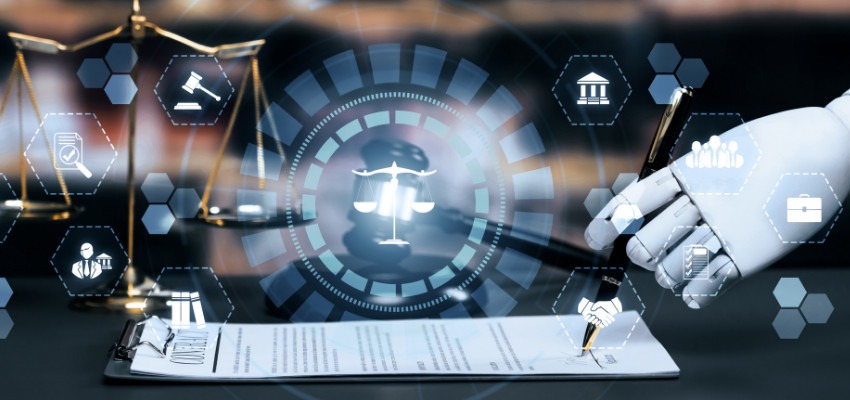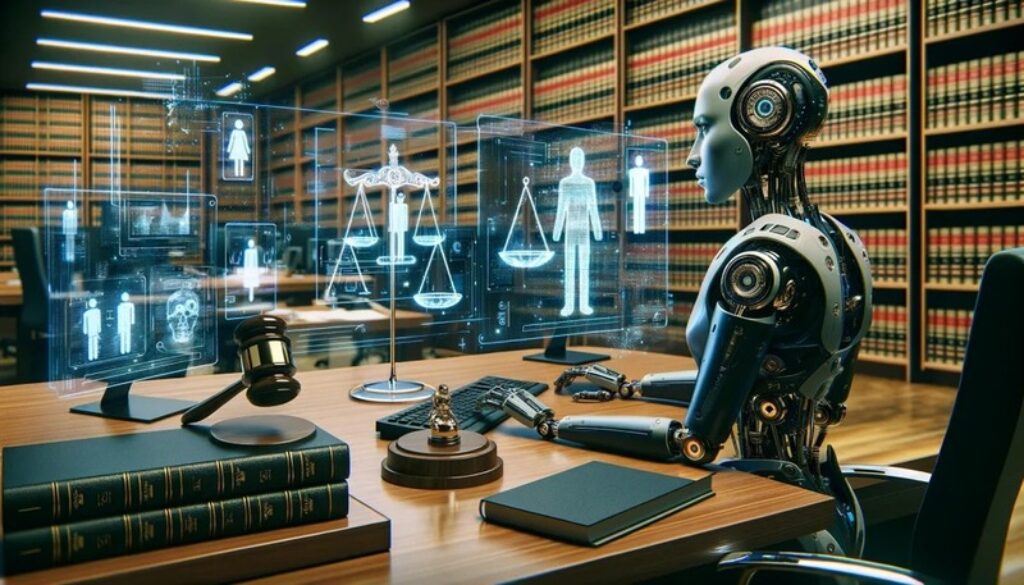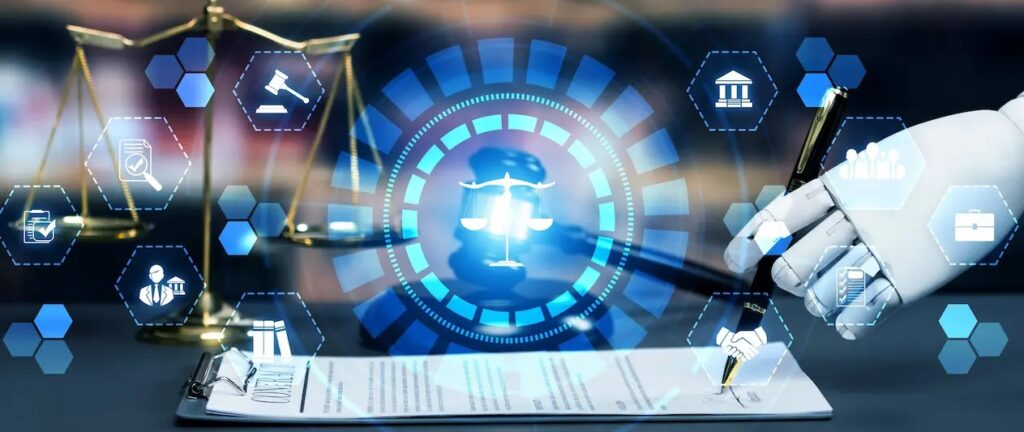
Ever wondered how artificial intelligence reshapes the law world without making it look like a sci-fi episode?
Most folks still picture suits, courtrooms, and stacks of case files when they think about legal matters. But reality has shifted. Machines now sort through documents faster than paralegals. Algorithms help predict case outcomes. Smart tools flag risky contracts in seconds.
No, robots won’t wear wigs and argue in court anytime soon. But they sure are changing the rules of the game.
Table of Contents
Key Points
- Machines now draft, sort, and analyze documents at lightning speed.
- Algorithms help lawyers spot weak spots in contracts or arguments.
- Tools track billable hours and streamline workflows.
- Law firms use traffic footage to strengthen accident cases.
- Smart chatbots handle client intake and follow-ups.
How Automation Is Handling the Dirty Work

Source: synlabs.io
Paralegals used to grind through piles of discovery. Now software does that in minutes. AI systems flag keywords, surface relevant files, and even sort information by case relevance.
Forget twelve-hour shifts copying depositions. One well-tuned program can eat through hundreds of case documents faster than your intern can grab coffee.
It’s not about replacing people. It’s about giving humans better tools so they can focus on strategy—not admin chaos.
Drafting Contracts Without Losing Sanity
No one enjoys contract review. You either need a legal background or a lot of caffeine.
Now there’s help.
Natural language tools comb through contracts and point out risky clauses, missing terms, or outdated references. They cross-check templates, suggest corrections, and keep track of updates.
It’s like spellcheck—but for liability.
You save time. You lower risk. And yes, your sanity remains intact.
Predictive Analytics: When Machines Start Acting Like Legal Analysts

Source: intuz.com
Some software can review a case history and spit out win probabilities. Sounds wild, but it’s already happening.
Here’s how it works:
- Algorithms process thousands of prior judgments.
- They look at judge behavior, plaintiff data, case timelines.
- They return odds for various outcomes.
Sure, nothing’s ever certain in court. But would you bet on a case without knowing the odds?
Didn’t think so.
The New Front Line in Auto Accident Cases
Evidence used to mean police reports and witness statements. Now? Think cameras, data feeds, and smart analysis tools.
Law firms like Omega Law, a personal injury firm, have taken advantage of A.I. software that is linked to traffic cameras. This helps in proving liability in auto accidents by matching timestamps, vehicle movement, and street patterns.
That data helps pin down what actually happened in a crash. It cuts through the “he said, she said” noise. It’s fast. It’s accurate. And it works.
Smart Chatbots and Client Intake Without the Pain

Source: nilead.com
Client onboarding is the least glamorous part of the job. Forms. Follow-ups. Missed appointments.
AI-powered bots now handle:
- Initial client conversations
- Answering routine legal questions
- Scheduling meetings
- Collecting necessary paperwork
No, they’re not perfect. But they save time, reduce mistakes, and allow your staff to focus on real work.
Plus, they work 24/7 and don’t need lunch breaks.
Billing, Time Tracking, and Admin Help
Every lawyer knows time is money. And also that tracking time sucks.
AI tools can now monitor activity across emails, document edits, and calendar events. They suggest billable time automatically.
No more guessing how long that contract review took. You get clean reports, faster invoicing, and fewer disputes.
Bonus? You stop leaving money on the table.
Sentiment Analysis in Jury Selection: Sounds Crazy, Works Well

Source: linkedin.com
Some firms test artificial intelligence tools that scan social media, past posts, and public data to help pick ideal jurors.
Creepy? Maybe.
Useful? Absolutely.
By analyzing tone, vocabulary, and interaction patterns, these tools try to identify biases or preferences. That info shapes how lawyers ask questions—or who they might strike from the list.
It’s not mind-reading. But it’s close enough to freak out your competition.
Legal Research on Turbo Mode
Pulling precedent used to be a nightmare.
Now you just type a few keywords, and systems scan case law, regulations, and legal opinions in seconds. Some tools even summarize findings with highlights and citations.
No more flipping through dusty casebooks. You now have digital help that cuts research time by over 70%.
And the best part? These tools don’t get tired or skip footnotes.
Language Translation in Global Cases
Multilingual legal matters used to slow everything down.
Now machine translation tools trained on lawful terminology can handle:
- Cross-border contracts
- Global mergers
- International compliance cases
No more hiring ten translators. No more weeks of delay. One good artificial intelligence platform can simplify it all.
You get clarity. You get consistency. You stay within budget.
Risk Management: The Silent Win

Source: linkedin.com
Law firms now use predictive systems to:
- Flag lawsuits before they escalate
- Identify clients with high liability exposure
- Track compliance risk across contracts
No drama. Just silent alerts and real-time dashboards.
It’s like a fire alarm for lawsuits. The earlier you act, the more you save.
Tips for Small Lawful Firms Adopting AI Tools
Let’s get real. Not every firm has a big tech budget. But even lean teams can benefit.
Start here:
- Use smart scheduling tools to book client calls
- Adopt a contract review plugin for faster drafting
- Track time with automated loggers
- Store documents in searchable databases
- Try chatbot plugins for FAQs on your website
Each step saves hours. Each tool reduces friction.
Compliance Tracking and Document Version Control
Firms deal with mountains of paperwork. That paper can bury you if you’re not careful.
Artificial intelligence platforms can monitor:
- Which documents need updates
- Who accessed them
- What changes were made
- Which versions are official
Forget old-school filing cabinets. Everything is clean, trackable, and secure.
And if someone messes up? You’ll know who did it—and when.
Human Judgment Still Wins the Final Word
For all the tech tools in the world, lawyers still need human instinct. That won’t change.
Machines give speed. Humans provide nuance.
You still need someone who knows when to settle. When to push. When to walk away.
AI can highlight the battlefield. You decide how to fight.
Pros and Cons of Integrating Smart Tools into Your Practice
No tool is magic. Every solution has trade-offs.
| Pros | Cons |
| Time savings | Learning curve |
| Improved accuracy | Software costs |
| Better client experience | Data privacy concerns |
| More data-driven decisions | Risk of overreliance |
Use tech wisely. Know its limits.
Law Firms Need Tech-Savvy Teams, Not Just Tech

Source: smokeball.com
You don’t just install software and win cases.
People matter.
Train your team. Show them how to use tools. Let them experiment and adapt workflows.
Software without human skill is like a racecar with no driver.
Tech isn’t the solution. It’s just part of it.
Final Words
The shift isn’t about replacing anyone. It’s about tools that support better decisions, faster results, and fewer errors.
Legal professionals who adapt stay sharp. Those who resist lose time, money, and clients.
If you had a calculator in a math test, would you leave it in the bag?
Didn’t think so.
Same deal here. The law world isn’t going robotic. It’s going efficient.
And firms like Omega Law already prove that smart tools help win tough cases. The rest just need to catch up.
Let smart tech handle the grunt work. You focus on the fight.
Need proof? Just ask the traffic camera.








